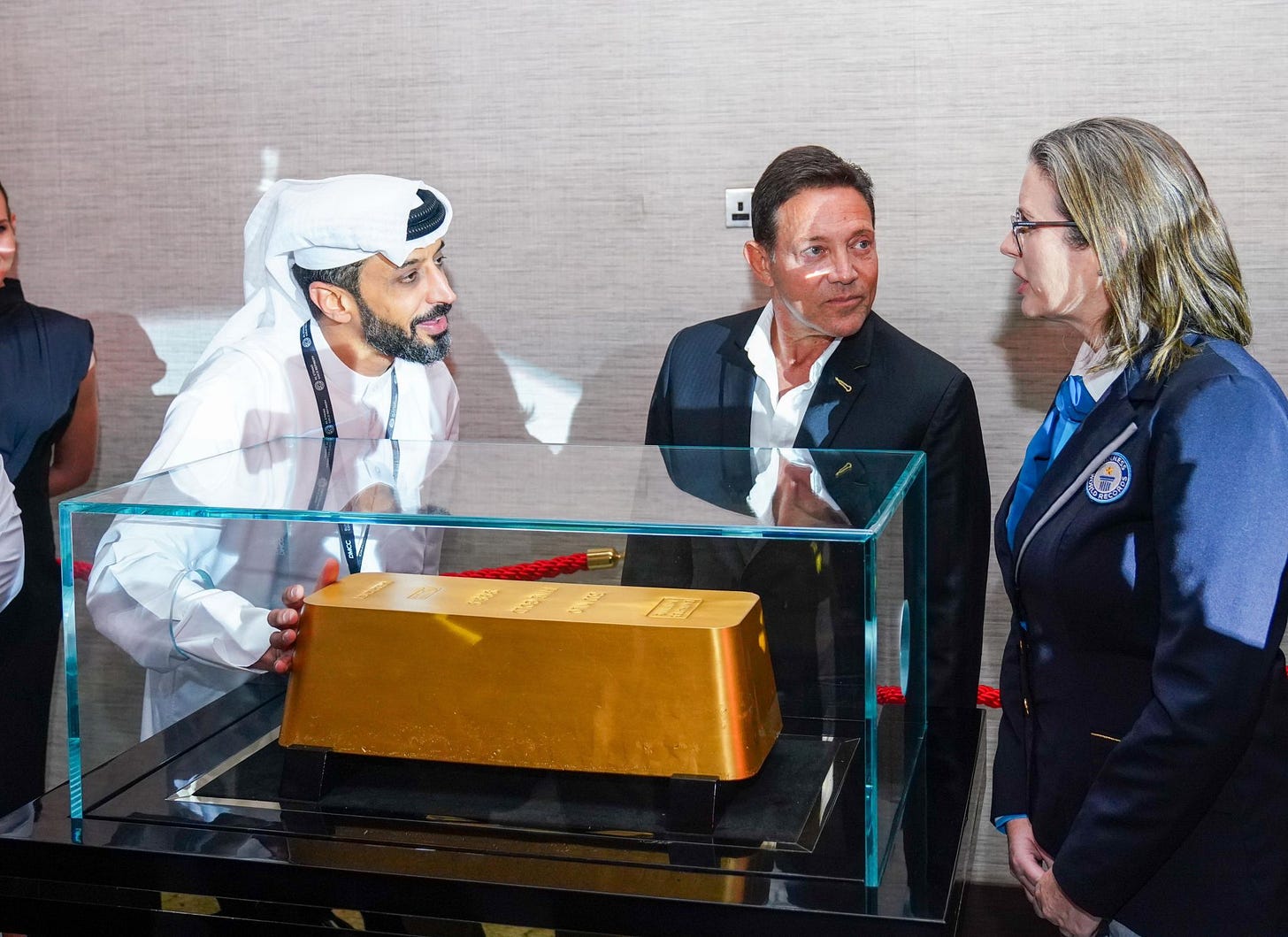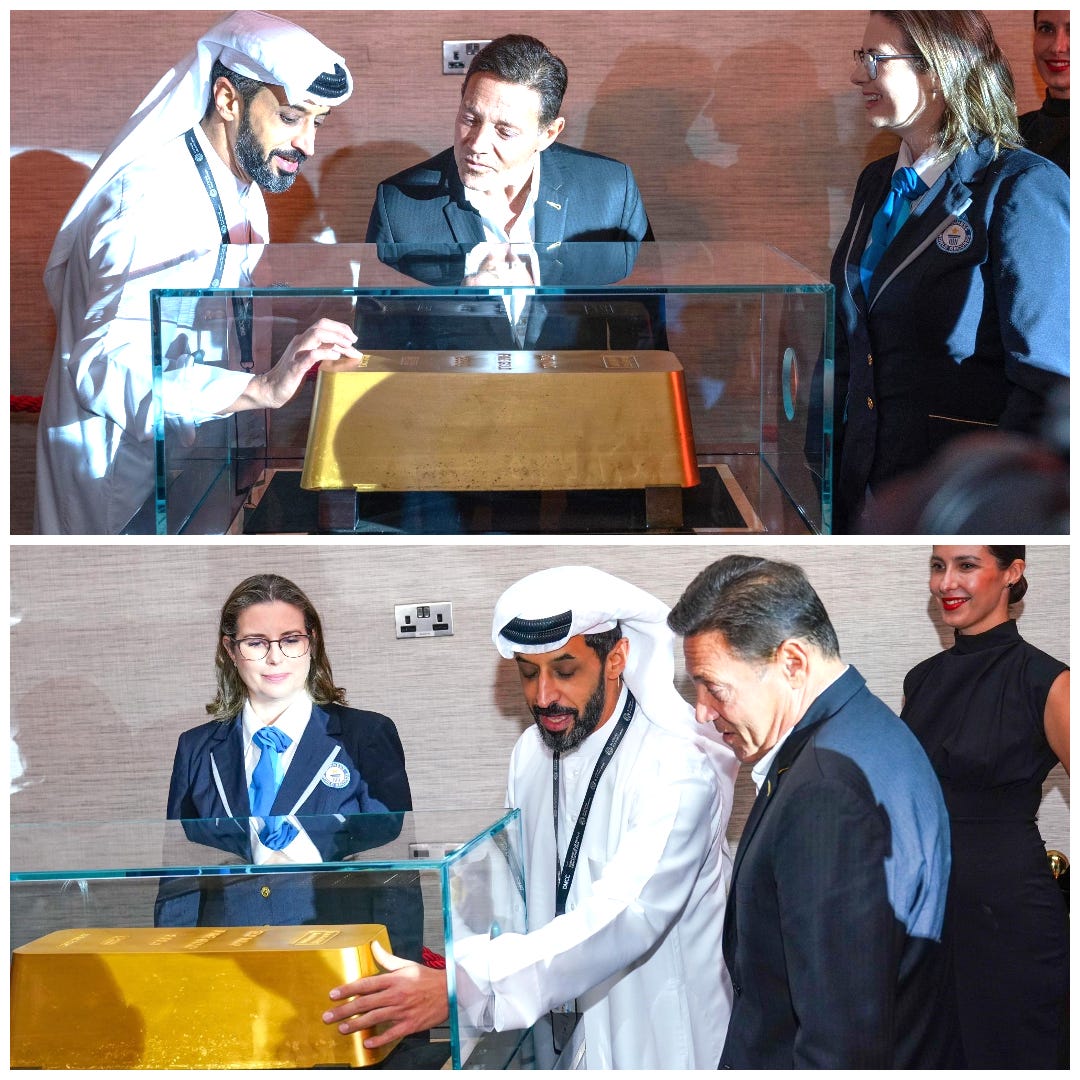Dubai's record breaking 300 kg gold bar
New 300 kg gold bar shatters previous record held by a 250 kg Japanese gold bar
In a city famous for setting records such as the world’s tallest building, the Burj Khalifa, a new record-breaking gold bar weighing an incredible 300 kgs (9600 troy ozs) has just been produced in Dubai, United Arab Emirates (UAE). At current gold prices, this 300 kg bar is valued at more than US$ 25 million.
Manufactured by Dubai based Emirates Minting Facility LLC, the massive new gold bar was officially certified as record breaking by Guinness World Records on 10 November 2024, and officially unveiled at the Dubai Precious Metals Conference (DPMC) on 19 November.

Comprising the equivalent of a mind boggling 24 ‘Good Delivery’ gold bars each weighing 400 ozs, the new ‘World’s Largest Gold Bar’ shatters the previous record which was held by a 250 kg gold bar made by Mitsubishi Materials Corporation in Japan in 2005.
While the Japanese record stood for 19 years, Dubai has thrown down the gauntlet by creating a 99.99% pure gold bar which is 20% heavier than the previous record holder, and has now taken the record breaking title from the Far East to the Middle East. A 300 kg gold bar is indeed a big statement.
Officially weighing 300.12 kgs (661 lb 10 oz), Emirates Minting Facility said that it created the new trapezoidal gold bar to highlight it’s technical skill in gold refining, and “as a way to honour the UAE's legacy” and reflect “the support of a nation that continues to inspire greatness.”

300 kgs = Twenty Four * ‘400’ oz’ bars
Not only is the new 300 kg gold bar equivalent to 24 ‘400 oz’ gold bars, it actually looks like it was literally made using 24 ‘400 oz’ gold bars.
In the following montage of images, which is taken from a LinkedIn video post by Emirates Minting Facility, you can actually see how the 300 kg gold bar was made, and that fact that is seems to use approximately twenty four “400" oz” gold bars, as raw ingredients in the manufacturing feat.
First the 400 oz gold bars are laid out on a table (from the screenshot you can see 20 bars on the table and 4 more in the crucible (mould). Then the bars are all inserted into the giant crucible which is in the shape of the 300 kg gold bar. Then what looks like an induction furnace uses electromagnetic induction to heat and melt the gold (to a temperature of 1,064°C), after which the molten gold cools and solidifies to create the new giant gold bar.

Security and Interactivity
The new 300 kg gold bar (which is owned by Emirates Minting Facility), is actually the latest member of an exclusive club of large record breaking gold bars which have been produced since the mid 1990s in Japan and Taiwan (see below), and like its predecessors, the 300 kg gold bar is housed in a secure transparent display case, but at the same time is an ‘interactive display’ which allows the gold bar to be touched.
In the case of the Dubai gold bar, this security extends to what looks like the transparent display case being made out of thick bullet proof glass, while interactivity is allowed via circular openings at each end of the transparent box which are large enough to put your hand and arm into.
Japan & Taiwan: In Positions 2 and 3
For every dramatic new world record created, an old record is shattered, and nowhere is this more striking than in the rarefied world of huge gold bars. Bars that were once at the pinnacle of size are now consigned into second and even third place, and are compelled to accept this inevitability.
But at the same time, the new record holder is in some ways “standing on the shoulders of giants”, for any new bar arguably exists due to the progress of its forebears, as well as the need to ‘beat’ the old weight benchmark. This is true of the new gold bar made by Emirates Minting Facility and the fact that it had weigh more than 250 kgs.
Therefore, let’s look quickly at the two gold bars which have previously been world record holders, one of which was still in pole position up until early November 2024, and both of which have inspired the new 300 kg bar.
Mitsubishi Materials 250 kgs gold bar, Japan
Created in June 2005 by Mitsubishi Materials Corporation at its flagship Naoshima Smelter & Refinery, in Kagawa Prefecture, Japan, the largest gold bar in existence prior to November 2024 is a 250 kg (551 lb 2 oz) gold bar of 99.99% gold purity which is housed at the Toi Gold Mine Museum (Ogon no Yakata) in Toi, Izu City, Shizuoka Prefecture, south west of Tokyo. This bar was officially certified by Guinness World Records in July 2005.

This 250 kg gold bar, which measures 45.5 cm by 22.5 cm at the base and is 17 cm high, was first put on public display at the Toi Gold Mine Museum in July 2005, and is also housed in a secure transparent box which has circular openings that allow museum visitors to put their hand and arm into to touch the giant gold bar. While this 250 kg gold bar held the ‘largest gold bar’ record between 2005 and November 2014, it will now have to rebill itself as the world’s ‘second largest gold bar”.

The reason Mitsubishi Materials Corp created a 250 kg gold bar back in June 2005 was to “win back” the world record title after the 200 kg gold bar which it manufactured in the year 2000 lost the world record title to a 220 kg gold bar that had been produced in Taiwan in 2004.
Taiwan’s 220 kg Gold Bar in Gold Museum
In October 2004, as an attraction for a new Gold Museum, which it established in New Taipei, the Taipei County Government decided to create a gold bar bigger than Mitsubishi’s 200 kg gold bar from the year 2000, and so borrowed gold from Taiwan’s central bank and cast a recording breaking 99.9 pure gold bar weighing 220.3 kgs. This gold bar was certified by Guinness World Records on 28 October 2004.

Since its creation, this 220 kg gold bar is on display at the New Taipei City Gold Museum, which is located in the mountainous town of Jinguashi in Ruifang, about 40 kms northeast of Taipei city.
According to Taiwan’s Central News Agency (CNA) at the time, “it took eight strong men to lift the ‘big golden brick’” into place when it was first brought into the museum, and here is a photo to prove it.

CNA also said that the 220 kg gold bar’s transparent display case was made of “reinforced bulletproof glass frame to protect it, but opened a hole on each side so that visitors can reach out and touch [the gold bar] to get a taste of the wealth.”
Conclusion
The progression of record-breaking gold bars tells a riveting story of innovation and international competition. Three gold bars, spanning three countries, two in Asia (Japan and Taiwan) and one in the Middle East (Dubai), highlight the global significance of the gold market. At the same time, Japan and Taiwan, long-established gold markets, have now been surpassed by Dubai, a growing and increasingly dominant global gold hub.
Dubai's leap to 300 kg with the new Emirates Minting Facility gold bar now sets an ambitious benchmark. By adding 50 kg in a one off move, this is the same combined weight increase that Taiwan and Japan added during their competitive one-upmanship between 2004 and 2005 when they raised the record from 200 kg to 250 kg.
With this new 300 kg bar, can Dubai maintain now its lead, or has it reawakened the Kraken?
Mitsubishi Materials demonstrated competitive spirit when it reclaimed the world record title in 2005 after Taipei County Government’s spunky move of 2004. Will Mitsubishi now awaken again from its slumber after resting on its laurels for 19 years? Or perhaps the Japanese zeitgeist and interest in national pride and precious metals will spur another of the Japanese precious metals zaibatsus to get involved, such as Asahi, Mitsui, Sumitomo, or Tanaka.
At 300 kg, Dubai and Emirates Minting Facility have undoubtedly made a big statement, but in the world of large gold bars, records are made to be broken.
On the other hand Dubai and the UAE have very deep pockets. And whereas the previous record holding large gold bars in Japan and Taiwan have always stayed on display in their respective museums, rumour has it that this 300 kgs gold bar will now go on tour to the capital cities of the world’s gold markets as a symbol of Dubai’s growth as a gold market and as a showcase of Dubai’s hunger to grow it’s gold market even more.
A world tour which is sure to require a team of at least “eight strong men” to lift the gold bar and a few more besides to protect it.






Hello, I can recommend to your readers that your company in Singapore is very ,very trustworthy source and I have used it personally for my retirement. Could you tell us if Trump will use the Exchange Stabilization Fund (ESF) to buy more gold and/or settle all claims on US Treasury gold? Will he then use this gold to back those 50-100 year, zero coupon “New Treasury Bonds” that Judy Shelton is advocating? Makes more sense than a Bitcon Reserve!
Very nice, but well below the Perth Mint 1 tonne "coin"